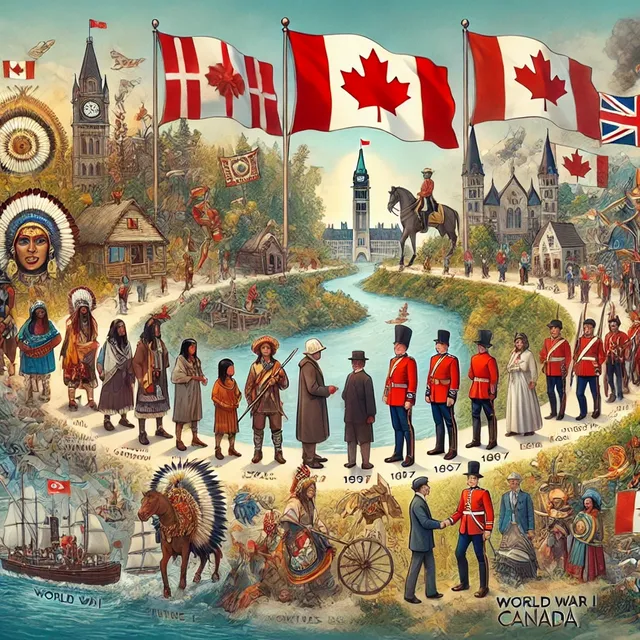Canada's history is shaped by its Indigenous peoples, European exploration, colonization, and the gradual path to nationhood. Here is an overview of key historical events:
- Indigenous Peoples (Pre-contact)
- Long before European explorers arrived, various Indigenous groups such as the First Nations, Métis, and Inuit lived across the land, developing rich cultures and traditions.
- European Exploration (Late 15th Century)
- 1497: John Cabot, an Italian explorer sailing under the English flag, is one of the first Europeans to land on Canada's Atlantic coast.
- 1534: French explorer Jacques Cartier explores the St. Lawrence River, claiming the land for France, marking the beginning of French influence in what would become Canada.
- Colonial Era (1600s–1700s)
- 1608: Samuel de Champlain founds Quebec City, solidifying France's presence in North America.
- Throughout the 17th and 18th centuries, French and British settlers established colonies, often clashing over control of the region, leading to numerous wars.
- The Treaty of Paris (1763) ended the Seven Years' War, with France ceding much of its North American territories to Britain.
4. Confederation (1867)
- On July 1, 1867, Canada became a self-governing dominion within the British Empire through the British North America Act, uniting the provinces of Ontario, Quebec, New Brunswick, and Nova Scotia. This is considered the birth of modern Canada.
Expansion and Growth (Late 19th Century)
- Over the next decades, more provinces and territories joined the confederation, including Manitoba, British Columbia, and Alberta, shaping the country's geographic and political landscape.
World Wars and National Identity (20th Century)
- Canada played significant roles in both World War I and World War II, which helped to strengthen its national identity and autonomy from Britain.
- In 1931, the Statute of Westminster granted Canada legislative independence from the UK, and by 1982, the Constitution Act brought the Canadian constitution under full domestic control.
Modern Canada
- Canada is now a multicultural and bilingual country with English and French as its official languages. It has a reputation for social progressiveness, peacekeeping, and economic development.
